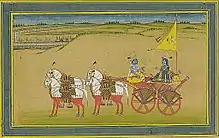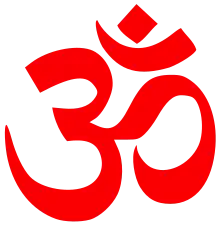| Gita Mahotsav | |
|---|---|
 | |
| Also called | Gita Jayanti |
| Observed by | Hindus |
| Type | Hindu |
| Date | 22 December 2023 11 December 2024 |
Gita Mahotsav (Sanskrit: गीतामहोत्सव, romanized: Gītāmahotsava), Gita Jayanti, also known as Mokshada Ekadashi or Matsya Dvadashi is a Hindu observance that marks the day the Bhagavad Gita dialogue occurred between Arjuna and Krishna on the battlefield of Kurukshetra.[1] It is celebrated on Shukla Ekadashi, the 11th day of the waxing moon of the lunar month Margashirsha (December–January) of the Hindu calendar.[2]
Bhagavad Gita

Structure
The Bhagavad Gita ("The Song of God") is a prominent Hindu scripture which forms a part of the epic Mahabharata.[3] The text itself is structurally divided into 18 chapters, containing 700 shlokas or couplets.[1][2]
Content
The Bhagavad Gita is presented as a dialogue between Arjuna, a prince, and Krishna, the embodiment of God. The contents of the scripture are derived from the Upanishads and discuss different paths of jnana (knowledge), karma (action) and bhakti (devotion) and how they lead to moksha (ultimate liberation) of the soul. The dialogue takes place just before the start of the Kurukshetra War. After several attempts at reconciliation failed, war was inevitable. The day of the war finally came, and the armies faced off on the field of war. Just as the battle was about to start, Arjuna asked Krishna to drive the chariot to the middle of the battlefield, to look more closely at the opposing forces. Seeing that the opposing side consisted of his relatives, teachers and friends, Arjuna was left in a state of moral dilemma about fighting them and sought help from Krishna. The conversation that ensued, Krishna's advice, messages and teachings to Arjuna, is what is known now as the Bhagavad Gita.[4]
Gita Aarti
_Aarti_Thali%252C_Prayer_Plate_India.jpg.webp)
The Bhagavad Gita Aarti[5] or Gita Aarti is a prayer not found in the Bhagavad Gita.
The aarti can be spoken, or sung with musical instruments to give more effect to worship. Aartis are usually performed at the end of the puja ritual. It is said that if there was any flaw in the puja, it may be fulfilled by the aarti.[6]
The first verse of the hymn is as follows:
jaya bhagavad gīte
jaya bhagavad gīte
hari hiya kamala vihārini
sundara supuṇīte
jaya bhagavad gīte— Verse 1
Celebration

During the International Gita Mahotsav, more than 300 national and international stalls are set up around the Brahma Sarovar in Kurukshetra city.[7] Pilgrims also undertake the 48 Kos Parikrama of Kurukshetra.
2016
In 2016, the Government of Haryana organized the International Gita Mahotsav from 6 to 10 December. Pranab Mukherjee, President of India, was to inaugurate the Mahotsav; later it was done by Kaptan Singh Solanki, Governor of Haryana, and Manohar Lal Khattar, Chief Minister.[8]
2017
In 2017, the Gita Mahotsav was held on 25 November to 3 December, inaugurated by Ram Nath Kovind, President of India.[9]
2019
The International Gita Mahotsav 2019 was inaugurated by Haryana Chief Secretary Keshni Anand Arora on 23 November 2019 on the bank of the Brahma Sarovar water pool in Thanesar, Haryana..
2020
The Government of Haryana celebrated the International Gita Mahotsav from 17 December to 25 December 2020.[10]
2021
Gita Jayanti 2021: Today on 14 December 2021, Gita Mahotsav was celebrated with great pomp.[11] This celebration was being held in Kurukshetra from 2 December to 19 December 2021.[12] International Gita Mahotsav is organized by Kurukshetra Development Board, Haryana Tourism, District Administration, North Zone Cultural Centre Patiala and Information and Public Relations Department Haryana.
Tradition
Reading Gita usually starts with Gita Dhyanam and the Gita Aarti sometime either found at the beginning or end of all the Gita chapters.[13][14]
See also
References
- 1 2 Staff, Dorling Kindersley Publishing (2 May 2017). The Illustrated Mahabharata: The Definitive Guide to India's Greatest Epic. Dorling Kindersley Limited. p. 238. ISBN 978-0-241-26434-8.
- 1 2 Davis, Richard H. (26 October 2014). The Bhagavad Gita: A Biography. Princeton University Press. p. 3. ISBN 978-0-691-13996-8.
- ↑ "Bhagavadgita | Definition, Contents, & Significance | Britannica". www.britannica.com. 8 October 2023. Retrieved 13 October 2023.
- ↑ Lochtefeld, James G. (2002). The Illustrated Encyclopedia of Hinduism: A-M. Rosen. pp. 93–94. ISBN 978-0-8239-3179-8.
- ↑ "Hindi Book Aarti Sangrah ( Complete ) by Gita Press". Gita Press. Retrieved 20 October 2017.
- ↑ "What is Aarti and How it should be done by Gita Press". Gita Press. Retrieved 20 October 2017.
- ↑ The Kurukshetra trail!, Asian Age, 10 Dec 2019.
- ↑ "Gita mahotsav begins in Kurukshetra - Times of India". The Times of India. Retrieved 25 December 2017.
- ↑ "Mauritius to partner with Haryana for Geeta Mahotsav - Times of India". The Times of India. Retrieved 25 December 2017.
- ↑ "Bhagavad Gita is major source of inspiration for youth: Khattar". The Indian Express. 26 December 2020. Retrieved 27 December 2020.
- ↑ "Gita Jayanti 2021: Today on 14th December, Gita Mahotsav was celebrated with great pomp". Khabar Satta (in Hindi). 14 December 2021. Retrieved 14 December 2021.
- ↑ "Gita Jayanti 2021 | International Gita Mahotsav 2021 | Gita Jayanti 2021 Dates". BhaktiBharat.com (in Hindi). Retrieved 19 December 2021.
- ↑ "ShrImad Bhagavad Gita". Retrieved 20 October 2017.
- ↑ "NRI sisters recite 700 Gita slokas from memory". RAJAMAHENDRAVARAM. 5 August 2017. Retrieved 20 October 2017.

